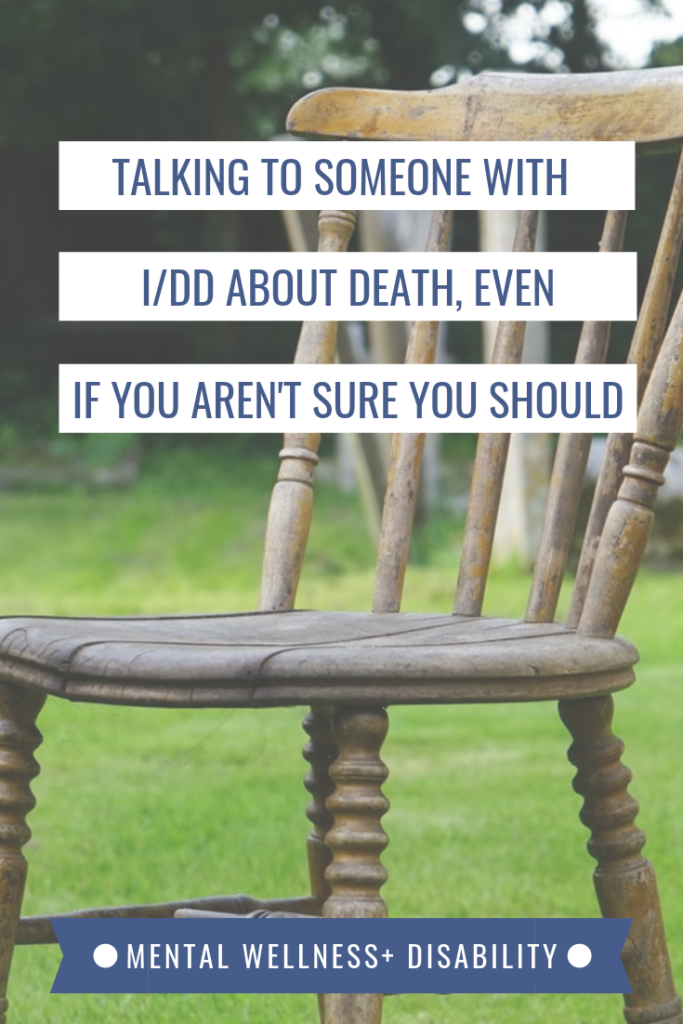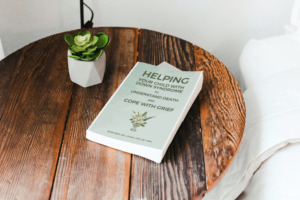Myths about people with Intellectual Disabilities and talking about death
There are some common myths that cause many parents and caregivers to question whether they should talk to someone with Intellectual Disabilities (ID) about death:
- They won’t understand (the conversation will just confuse them)
- They don’t experience grief (so it would be pointless)
- It will upset them unnecessarily (so it would be easier to go on as if nothing has happened or changed)
These myths can lead to a ‘conspiracy of silence’ when someone that a person with ID knows dies. In some extreme cases, people with ID aren’t told when they themselves have a terminal illness and are dying, because caregivers are trying to protect them.
In reality, people with ID do experience grief. It is true, though, that their timeline and progression through feelings about death can be very different from ‘typical’ responses. For example, expression of grief in people with ID may take many forms, including:
- Changes in eating and sleeping
- Increased irritability/distractedness
- Crying
- Increased anger/aggressiveness
- Loss of previously mastered skills
- Resistance to necessary changes in routine
In my counseling practice I provide therapy to people with Intellectual Disabilities. Many clients will ruminate on death and their sadness about it for many years. They will often communicate that they equate other losses as being similar to what they felt when someone died. For example, clients will discuss that a breakup causes sadness similar to when a grandparent died.
Why caregivers don’t talk about death with people with Intellectual Disabilities
What I hear from caregivers, and what research supports, is that many caregivers don’t discuss death with people with ID. Usually, this is because they are afraid they’ll say the wrong thing. They worry they will make things worse or cause unnecessary worry.
Sadly, by not talking about death, or by falling into some common communication traps when attempting to, many caregivers inadvertently make death harder for the person with ID to understand and accept.
To be clear, even for me as a professional who offers grief counseling for people with disabilities, it can be challenging to talk to someone with Intellectual Disabilities about death.
It is a balancing act. You must be sure to:
- Confirm the person understands
- Anticipate questions and concerns they can’t articulate
- Accept seemingly bizarre responses
- Validate genuine emotional hurt and worry
Though this is difficult, I hope you see that it is critical for the person with ID that you try to help them understand the death of loved ones, and how it will impact them.
Strategies for how to talk to someone with an Intellectual Disability about death
Talk about death often
Take advantage of natural opportunities to talk about death, and do so frequently.
If you notice a dead animal while walking in the woods, stop and look at it. Encourage conversation about how it is no longer alive, and how it might have died. Explain that this animal will never be alive again.
When passing by a cemetery, take the opportunity to talk about each headstone representing a person who has died. You might talk about religious or cultural traditions around death that are important in the person’s faith or culture.
In films, use depictions of death as an opportunity to talk about the permanence of death. Discuss the characters’ responses to death and normalize that they are appropriate and expected. For example, you might say “Elsa is crying because she is sad that her parents are dead. Elsa knows that this means she will never see her parents alive again. Growing up without her mom and dad there to take care of her is scary to her.”
Engage in these conversations whether or not the person asks questions about death in these instances, or even in general.
Use concrete language
It is really important to avoid ALL euphemisms and generalities when talking about death. People with ID are best able to understand concepts that caregivers present using concrete language.
We use euphemisms to soften the realities of death and give us comfort. But they but can have just the opposite effect for people with ID.
At best, they may cause confusion and false hope. For instance, if we say that a deceased person ‘went to a better place’, the person with ID may persist in wondering when they’ll return from this better place.
Often times though, using vague, euphemistic language can actually cause more significant troubles.
I’ve worked with a number of clients whose well-meaning parents told them that a dead relative ‘went to sleep and never woke up’.
These individuals, afraid that they, too, might go to sleep and never wake up, developed significant anxiety every night at bedtime. Now, in addition to coping with grief, they also had to recover from a fear of falling asleep and related sleep deprivation.
It is possible to explain the mechanics of death using very simple language, and referencing understood concepts.
You can describe a heart attack, for example, as being like to a clogged pipe. “If blood cannot flow through the heart’s pipe because it is clogged, the heart cannot work. If a person’s heart cannot work, then their body cannot work, and then they die.”
Anticipate a lack of questions, or unrelated follow up questions
Sometimes you may tell someone with ID that a loved one has died, and they might respond by saying nothing, or by asking something totally unrelated, like “What’s for dinner?”
This does not mean that the person hasn’t heard or isn’t processing the information. It can be especially hard for family to accept responses like this, but try to remember that this doesn’t mean that they don’t care. Do not criticize the person with ID for being uncaring.
Allow some time to pass, and check in again. It is likely that the person with ID simply needed time to process this new information and what it will mean for them.
It is also true that they may not fully begin to understand what has happened until there are noticeable changes to their daily routines or home environment.
I had a client who didn’t truly grasp the permanence of her father’s death until a landscaper started mowing their yard, a task her father had done previously. Only then, a few months after his funeral, did she really understand that her father wasn’t going to come back.
Provide a framework for questioning
If you ask the person with ID “Do you have any questions?”, the likely answer will be “No”.
Instead, try giving them a framework for how to ask questions. Show them how to acknowledge what will be different now that someone has died. Ask what this will mean for them and their daily routine/environment: This will also help them to feel more normal for having questions related to death.
“I’ve had a lot of questions about our dog dying. We have a dog bed in our living room that Rover slept on. Since Rover died and his body was buried, he won’t sleep on the bed any more. You may be wondering what will happen to the dog bed now. Tomorrow we will take it to the animal shelter so that a dog that doesn’t have a bed can use it. When that happens, we won’t have a dog bed in the living room any more, and that will be a big change. What questions do you have about how other things may change now that Rover has died?”
It will likely be easier, and more comforting, to start by addressing questions about daily routines and typical roles, rather than trying to tackle questions about complex emotional responses right away.
Address the questions that aren’t being asked
When the person does ask questions, answer the question that’s being asked, but listen for other underlying worries and address those, too.
For instance, if someone with ID asks a favorite caregiver “When will you die?” they may be expressing that they understand the finality of death, and are concerned about what it will mean for them and their current daily routines.
In this case, it might be appropriate to respond “I don’t expect to die for a long time. I expect to be here to take care of you for a long time. But, if I do die, there are a lot of other people who will be here to care for you, like {list out names}. Does that answer your question?”
Anticipate other concerns and address them
Common ones might be “can I catch cancer, like I can catch a cold from someone?”, or, “Do I get a new mom now?”. Even if those questions aren’t communicated, it can be comforting to the person with ID to have them addressed anyway.
Avoid expressing hope as fact
When we are faced with the prospect of death, we often state hopes and prayers as statements such as by saying “He will be fine.” We use affirmation and positivity to give ourselves comfort.
For someone with an intellectual disability, though, this sounds like a promise, and is not clearly recognizable as simply a hope. This can cause the person with ID to significantly distrust you if your hope doesn’t come to pass, and the loved one dies.
Be clear by saying “I hope he will be fine, and I trust his doctors to take the best care of him that they can. But I also know that he is very sick, and that he may die. This makes me sad and scared.”
When you do this, you are modeling that it is OK to talk about death. You are showing the person that it’s healthy to have strong emotional responses to death.
Even for me as a professional counselor who specializes in helping people with disabilities cope, it can be difficult to know how to talk to someone with an Intellectual Disability about death.
While I understand how caregivers might think it’d be easier to just avoid talking about death, I have seen that it is much easier to focus instead on talking about it in ways that the person with ID can understand
I hope that this post has given you some good guidance for having these difficult conversations. If you know someone who would benefit from reading this, please use the social buttons to share it with them.
Keep reading
Other posts you may be interested in
How to Know if Someone is a Real Friend. A Quiz for Teens and Adults with IDD.
In my counseling practice, I offer mental health counseling for teens and adults with IDD. Many of my clients who have Down syndrome, Cerebral palsy, and other disabilities have lots of meaningful friendships in their lives. But sometimes, they ask “how can I know if someone is a real friend?” Maybe you have a friend […]













